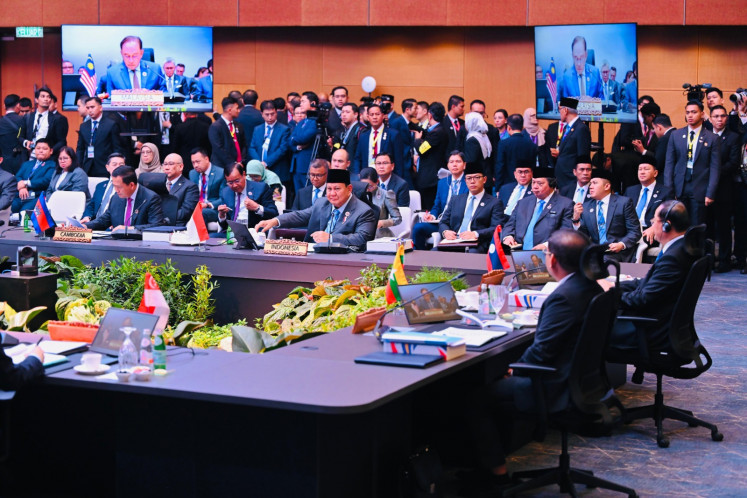Popular Reads
Top Results
Can't find what you're looking for?
View all search resultsPopular Reads
Top Results
Can't find what you're looking for?
View all search resultsSatinah's fate uncertain as execution nears
The Foreign Affairs Ministry announced on Tuesday that the decision to execute Satinah binti Jumadi Amad, an Indonesian migrant worker who was convicted of murder in Saudi Arabia, remained in the hands of the victimâs family
Change text size
Gift Premium Articles
to Anyone
T
he Foreign Affairs Ministry announced on Tuesday that the decision to execute Satinah binti Jumadi Amad, an Indonesian migrant worker who was convicted of murder in Saudi Arabia, remained in the hands of the victim's family.
According to the director of legal aid and protection of Indonesian nationals oversees, Tatang Budie Utama Razak, at the Foreign Affairs Ministry, the family of the victim has requested diyat of 7 million riyals, which is equal to Rp 22.5 billion (US$1.87 million).
Diyat is financial compensation paid to the victim's heirs and the amount is decided by them. Whether or not diyat is paid, it is ultimately up to the victim's family to decide whether to annul Satinah's death sentence.
Thus far, the Foreign Affairs Ministry has put together 4 million riyals ' 3 million riyals from the ministry, 500,000 riyals from the Indonesian Labor Exporters Association (APJATI), and 500,000 riyals from donations.
'The victim's family requested 7 million riyals. There are still a lot of factors we don't know about; some members of the family might not agree, some might want the execution, there are others who might not care anymore and are just glad that they can get the money,' he said.
'We paid 2 million riyals for Darsem [another convicted migrant worker who was on death row in Saudi Arabia in 2011 before he was freed after the payment of diyat]. Although [Satinah's victim's family] had initially asked for 10 million riyals, the amount on offer is now 4 million riyals,' Tatang said.
He added that the government was reluctant to pay the initially asked amount without negotiating.
Satinah, who was convicted of murdering her employer, Nurah al Gharib, has been imprisoned in Saudi Arabia since 2006. She was sentenced to death in 2011. Originally, she was to be executed in August 2011, but her execution date has been delayed three times.
Satinah was most recently set to be executed in early February 2014, but with the help of Lajnah Afwu, a forgiveness institution facilitated by the Saudi Arabian government and Prince Faisal bin Bandar, the governor of Al-Qassim province, it has been postponed for two months. However, if the victim's relatives refuse the diyat, Satinah will be executed on April 3, 2014.
Data provided by the Foreign Affairs Ministry said that 173 out of 422 Indonesian nationals overseas who faced the death sentence between 2011 and 2014 were freed.
Former Indonesian ambassador to Saudi Arabia Gatot Abdullah Mansyur said that many Indonesian migrant workers had been convicted because they lacked knowledge of the laws in the countries they were working in. Migrant workers are often unaware that adultery and black magic are serious offences in Middle Eastern countries.
Two other Indonesian migrant workers, Sriwayuningsih and Ati, who previously had their death sentences annulled, also attended the press gathering with their families to share their experiences.
Sriwayuningsih, from Donggala, Central Sulawesi, was freed of adultery charges by the Madinah General Court, while Ati, from Sukabumi, West Java, was freed of charges for using black magic, by the Ahsa General Court, Riyadh.










